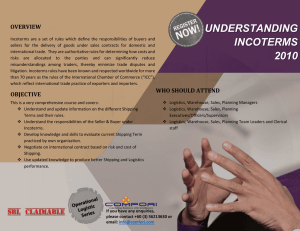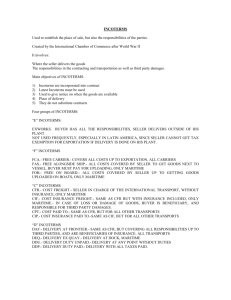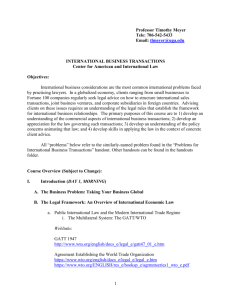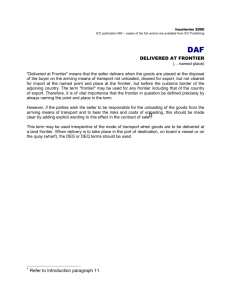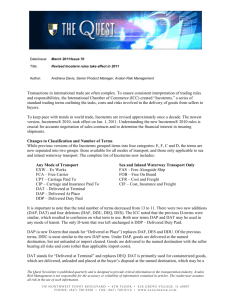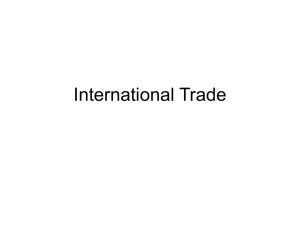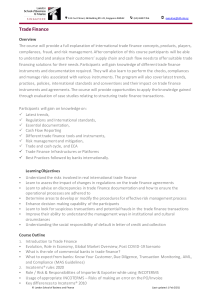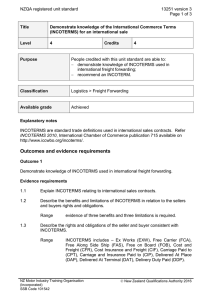International Business Transactions
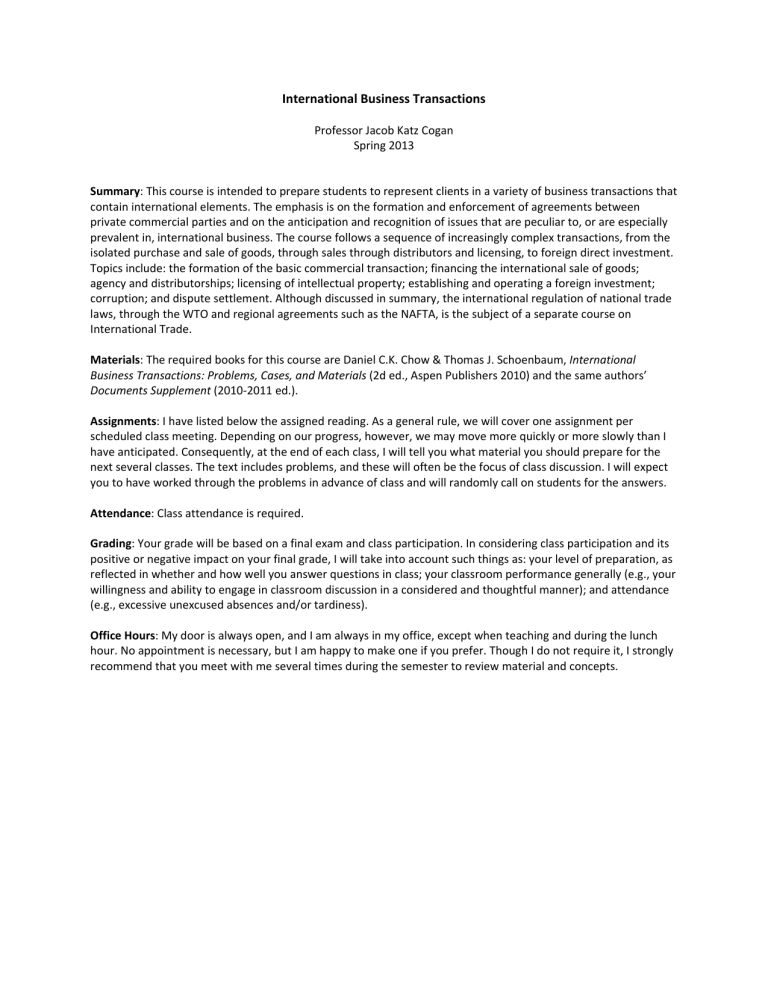
International Business Transactions
Professor Jacob Katz Cogan
Spring 2013
Summary : This course is intended to prepare students to represent clients in a variety of business transactions that contain international elements. The emphasis is on the formation and enforcement of agreements between private commercial parties and on the anticipation and recognition of issues that are peculiar to, or are especially prevalent in, international business. The course follows a sequence of increasingly complex transactions, from the isolated purchase and sale of goods, through sales through distributors and licensing, to foreign direct investment.
Topics include: the formation of the basic commercial transaction; financing the international sale of goods; agency and distributorships; licensing of intellectual property; establishing and operating a foreign investment; corruption; and dispute settlement. Although discussed in summary, the international regulation of national trade laws, through the WTO and regional agreements such as the NAFTA, is the subject of a separate course on
International Trade.
Materials : The required books for this course are Daniel C.K. Chow & Thomas J. Schoenbaum, International
Business Transactions: Problems, Cases, and Materials (2d ed., Aspen Publishers 2010) and the same authors’
Documents Supplement (2010-2011 ed.).
Assignments : I have listed below the assigned reading. As a general rule, we will cover one assignment per scheduled class meeting. Depending on our progress, however, we may move more quickly or more slowly than I have anticipated. Consequently, at the end of each class, I will tell you what material you should prepare for the next several classes. The text includes problems, and these will often be the focus of class discussion. I will expect you to have worked through the problems in advance of class and will randomly call on students for the answers.
Attendance : Class attendance is required.
Grading : Your grade will be based on a final exam and class participation. In considering class participation and its positive or negative impact on your final grade, I will take into account such things as: your level of preparation, as reflected in whether and how well you answer questions in class; your classroom performance generally (e.g., your willingness and ability to engage in classroom discussion in a considered and thoughtful manner); and attendance
(e.g., excessive unexcused absences and/or tardiness).
Office Hours : My door is always open, and I am always in my office, except when teaching and during the lunch hour. No appointment is necessary, but I am happy to make one if you prefer. Though I do not require it, I strongly recommend that you meet with me several times during the semester to review material and concepts.
Assignments
Introduction
1. IBT Background, pp. 1-24, 29-34 (January 23)
International Sale of Goods
2. Overview of the International Sales Transaction, pp. 51-68 (January 28)
3. Transport Law: Commercial Terms and Their Interpretation; Documents of Title, pp. 68-90 (January 30)
4. Transport Law: Contracts of Affreightment; The Bill of Lading, pp. 90-112 (February 4)
5. Transport Law/Insurance Law: The Bill of Lading (cont.); excerpt from Kawasaki Kisen Kaisha, Ltd. v. Regal-
Beloit Corp.
(to be distributed); Marine Insurance, pp. 112-132 (February 6)
6. Customs Law: Export Trade Matters; Import Trade Matters, pp. 132-157 (February 11)
7. Customs Law: Import Trade Matters (cont.), pp. 157-173 (February 13)
8. International Sales Law: Choice of Law; Introduction to the CISG, pp. 175-193 (February 18)
9. International Sales Law: CISG – Interpreting the Convention, Contract Formation, pp. 193-212 (February 20)
10. International Sales Law: CISG – Performance, Remedies, pp. 212-234 (February 25)
11. Letter of Credit Law: Overview, pp. 235-242 (February 27)
12. Letter of Credit Law: The Independence and Strict Compliance Principles, pp. 242-264 (March 4)
13. Letter of Credit Law: The Fraud Exception, pp. 264-280 (March 6)
14. Letter of Credit Law: Standby Letters of Credit, pp. 281-296 (March 11)
15. Catch-Up/Review (March 13)
Non-Establishment Forms of International Business
16. Agency and Distributorships, pp. 297-322 (March 25)
17. Technology Transfer and Licensing, pp. 322-350 (March 27)
18. Business Format Franchising, pp. 350-364 (April 1)
Foreign Direct Investment
19. International Investment Law, pp. 365-394 (April 3)
20. International Investment Law (cont.), pp. 394-420 (April 8)
21. The Law of the Investor’s Home Country: Foreign Corrupt Practices Act, pp. 420-444 (April 10)
22. The Law of the Foreign Country: FDI in China, pp. 482-499 (April 15)
23. The Law of the Foreign Country: FDI in China (cont.), pp. 500-518 (April 17)
24. Catch-Up/Review (April 22)
Dispute Resolution
25. Litigation or Arbitration? (Part 1), pp. 613-619, 665-684, 692-696, 707-715 (April 24)
26. Litigation or Arbitration? (Part 2), pp. 619-644, 655-657 (April 29)
IBTs in Retrospect
27. Review Session (May 1)
Note: Because the casebook was published in early 2010, it refers to Incoterms 2000. Since then, a new version of
Incoterms has been issued – Incoterms 2010. For our purposes, the differences between Incoterms 2000 and 2010 are inconsequential, so we will rely on the book’s excerpts from Incoterms 2000 (see assignment 3).
-2-


